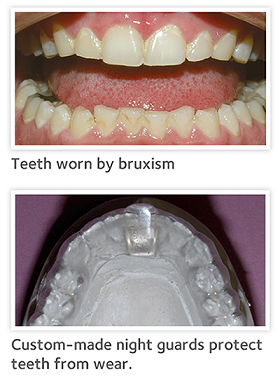Preventative
Preventative Dentistry
When you are grinding your teeth or clenching your jaw, it’s called bruxism (BRUCKS-is-im).
Grinding is when you slide your teeth back and forth over each other. Clenching means you tightly hold your top and bottom teeth together. Bruxism is something that children and adults of any age may do.
Many people with bruxism wake themselves up during the night with a loud grating or grinding sound. The sound may even be loud enough that other people can hear it. However, bruxism may also be silent.
People who suffer from bruxism may have one or more of these symptoms:
- headache or earache
- sore jaw
- jaw clicking
- frequent toothaches
- sensitive teeth
- facial pain
- worn or cracked teeth or fillings
- markings from pressing your teeth into your tongue
- trouble sleeping
What causes bruxism?
Stress, sleep disorders and a bite that is not normal are some things that may play a role. What is causing you to grind your teeth may not be known for sure.
Your dentist can see if you have bruxism by checking for unusual wear spots on your teeth and looking at any related symptoms. Regular dental checkups are important to find damage in the early stages. Your dentist can help you manage bruxism and the related symptoms, as well as repair your teeth if necessary and help prevent further damage.
How is bruxism treated?
Your dentist may recommend that you wear a night guard during sleep. Night guards are custom-made by your dentist from plastic or other materials. The night guard slips over your upper or lower teeth and prevents them from touching. It protects your teeth and helps keep them from wearing down.
Treatment depends on each person’s situation. Your dentist may also suggest one or more treatments, such as these:
-
- ways to lower stress
- medication for pain or muscle spasms
- exercises to relax jaw muscles
- fillings or other dental treatment to repair damaged teeth
- You may need to try a few different treatments to find out what works for you. You can help manage bruxism by paying attention to the symptoms, having regular dental visits and talking with your dentist.

-
-
- Dental bonding can be performed by the dentists at Benyammi Family Dental to resolve a variety of cosmetic dental issues. To perform a cosmetic bonding, the dentist applies a tooth-colored resin (composite) to the tooth or teeth in question. That resin is then hardened through the use of a special ultraviolet light. The material is then polished and shaped to ensure a natural look and feel.
- Cosmetic bonding can be a wise treatment choice in any of the following situations:
- Damage sustained from a cavity or tooth decay
- To alter the appearance of a tooth that is short, discolored, or misshapen
- To close an existing space or gap between teeth
- To repair a slight fracture in a tooth
- To replace older dental fillings that have started to fail
- To protect tooth roots, which have been exposed because of receding gums
- To repair minor tooth crookedness
-
-
-
- Dental bonding can be performed by the dentists at Benyammi Family Dental to resolve a variety of cosmetic dental issues. To perform a cosmetic bonding, the dentist applies a tooth-colored resin (composite) to the tooth or teeth in question. That resin is then hardened through the use of a special ultraviolet light. The material is then polished and shaped to ensure a natural look and feel.
- Cosmetic bonding can be a wise treatment choice in any of the following situations:
- Damage sustained from a cavity or tooth decay
- To alter the appearance of a tooth that is short, discolored, or misshapen
- To close an existing space or gap between teeth
- To repair a slight fracture in a tooth
- To replace older dental fillings that have started to fail
- To protect tooth roots, which have been exposed because of receding gums
- To repair minor tooth crookedness
-
Fluoride is a mineral that interacts with the calcium and minerals that already exist in your mouth and saliva, helping to safeguard against decay. Fluoride also serves to harden and re-mineralize many of the small imperfections that develop in tooth surfaces.




